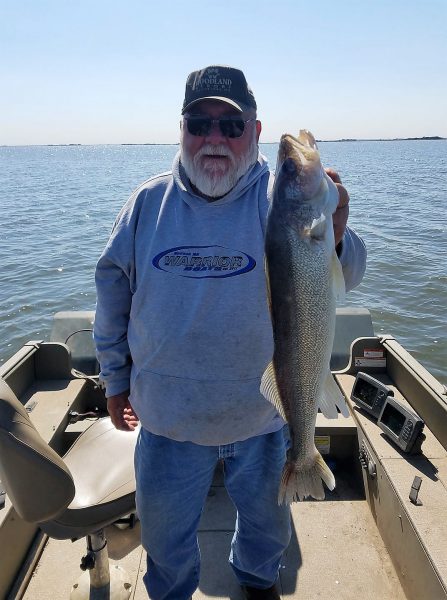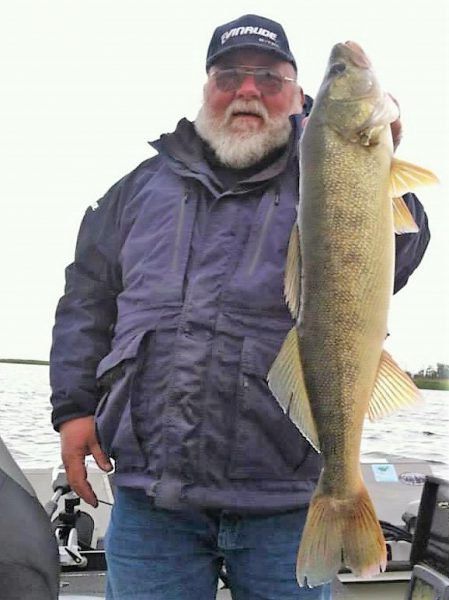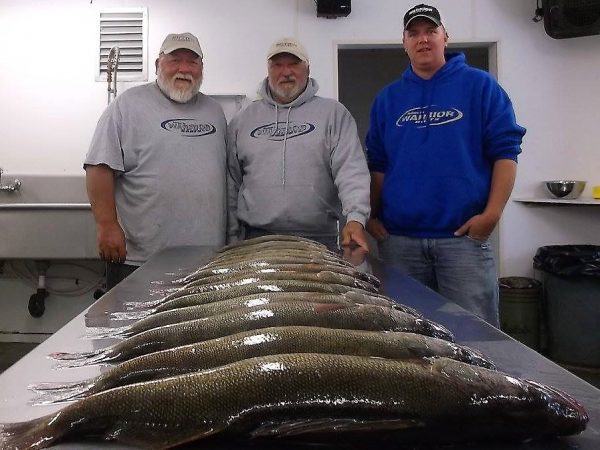Walleye Tournament Legends: Pete Harsh
Category: article
Apr 19th, 2019 by fishing fanatics
Modified Apr 19th, 2019 at 10:00 AM
Professional walleye fishing tournaments have been around for decades. In fact, the peak of the pro scene was in the early 2000s when the Masters Walleye Circuit (MWC) was rocking with nearly full fields at every event, the Professional Walleye Trail (PWT) was still up-and-running, and the FLW Walleye Tour was just getting started (originally the RCL for boat companies, Ranger, Crestliner, and Lund). During that peak, there were a few anglers who stood apart from the rest for sure, and one of them was Pete Harsh.

Harsh is a matter-of-fact Minnesotan with a savvy and nuanced ability to maneuver through both the political business side of the sport fishing and boating industry and to be able to function as one of the most skilled anglers that pro walleye fishing has produced.
It was around 1983 when Pete began his journey toward becoming a true force in walleye tournament fishing.
“I just love to fish,” said Harsh. “I’ve been involved in the sport fishing business in one capacity or another since 1981. You’ve got to really love something to stay at it so long. I’ve sold a lot of product and caught a lot of fish in this time.
“I took my love of walleye fishing and decided I needed to test my skills. So, I fished my first local cash tournament in 1983. It was a 100 boat or more event, the Walleye Masters Classic.
“Then, I fished the Banyan Circuit in Minnesota. I was thoroughly enjoying the competition and the learning. My skills were definitely improving. That was always important to me, learning and improving as an angler.”
Pro tournaments were not far off for Harsh. His competitive drive propelled him to take the next step and test his abilities on the MWC, the top team walleye fishing circuit of the time.
“In 1988 my fishing partner, Steve Winges, and I decided to fish the MWC. We had trouble getting off work then, so we only fished 5 of 6 events. We had some solid success and slowly got better over time.
“I wanted to be competitive everywhere I went, to eliminate all of my mistakes. I felt that I could usually defeat the majority of the competitors, but still needed more.

“I became very focused on success. It’s the little bit of perfectionist in me. I worked hard to read the water, whether it was rivers, lakes, or reservoirs. We fished 5 or 6 states in the MWC, and learned that no matter where you fish, you need to learn and master all of the techniques to become good. The ability to be versatile and skillful at those methods of fishing, even the ones you don’t like, is necessary for success. I didn’t like using a slip bobber, but ended up having great success fishing with them.”
As Harsh’s skillset increased, so did his desire to compete against the best anglers. His partner Steve had to move on for work and family, but Pete prioritized his tournament fishing. In 1993, he joined the PWT and made a big splash.
“I won Rookie of the Year after my first season on the PWT,” stated Harsh. “I was so far ahead of the field that I would’ve won it even if I didn’t fish the last event.
“I had a lot of success fishing the PWT. I figured the better the competition, the better I’d get, and it was true. Some amazing anglers were fishing there at the time, but I didn’t stick around.”
Harsh didn’t just bail out on the PWT and fishing, he was given a huge opportunity and he ran with it.
“I took a couple of years off from the PWT and took a position with Warrior Boats,” states Harsh. “I helped them rebuild the brand. It was a full-time job, so I couldn’t compete. I was still competing by working with Warrior, just not in tournaments.
“But I had the desire to come back. So, in 1998, I made a comeback. I was told by many people that the current methods and techniques the anglers on the PWT were using far surpassed me.
“Also, there was an article in a magazine at the time essentially claiming the tiller boat was dead for pro walleye fishing, yet that is what I used. Yeah, it seemed stacked against me. I stuck to my tiller boat, was dubbed “Mr. Tiller” because of it, and still won and cashed checks and learned and improved. I was glad I came back.”
Then, the perfect storm of pro walleye fishing hit: the RCL (later FLW Tour) was born. Harsh fished that lucrative trail along with the PWT. The opportunities were many for a walleye pro in the early 2000s.
“The RCL was huge,” said Harsh. “There were some whiners fishing the PWT who claimed it was better because they were “factory pros”, but that wasn’t true. Any of the pros who ran a Ranger, Crestliner, or a Lund fished the RCL and the PWT if they were already part of it.
“For me, the RCL and FLW were wonderful, especially getting to know the people and one man in particular, Sonny Reynolds. He was the Tournament Director. The best tournament director ever in my opinion. An honest, straight shooter, and a hell of a good man.
“By this point in my career, I won a lot of money, had the experience, knowledge, and network of people in the industry. The world of professional walleye fishing looked to be a solid fixture, but it all fell apart.”

A recession hit, the PWT folded, and according to many, the money was mismanaged there for years. The FLW Tour for walleye took down its shingle and the MWC, though still functioning, hasn’t experienced the glory of the past.
Harsh has moved on. He guides now on Devils Lake in North Dakota with PerchPatrol.com, gives seminars and attends a few consumer shows. Pete still wants to learn more and share knowledge.
“When I’m giving a seminar about tournament fishing, I always let the young people know you need to leave your ego at the dock,” said Harsh. “One thing I was always conscious of, and still am, when I give seminars and talk to folks about wanting to fish tournaments, don’t get arrogant.
“I got arrogant from time-to-time, it’s human nature, but there is a fine line between confidence and arrogance. Celebrate your victories for a few minutes, then move on to the next competition.
“Now, I take people out on premium fishing trips on Devils Lake. My goal is to put the client on quality fish and teach them what they need to know to catch them. There is nothing more rewarding to experience than a client who catches their biggest fish or the most fish they’ve ever caught. It’s fun and exciting for me.
“I’m no longer physically able to fish a pro trail, but I sure had fun doing it. I made a lot of great friends and met some wonderful people along the way.”